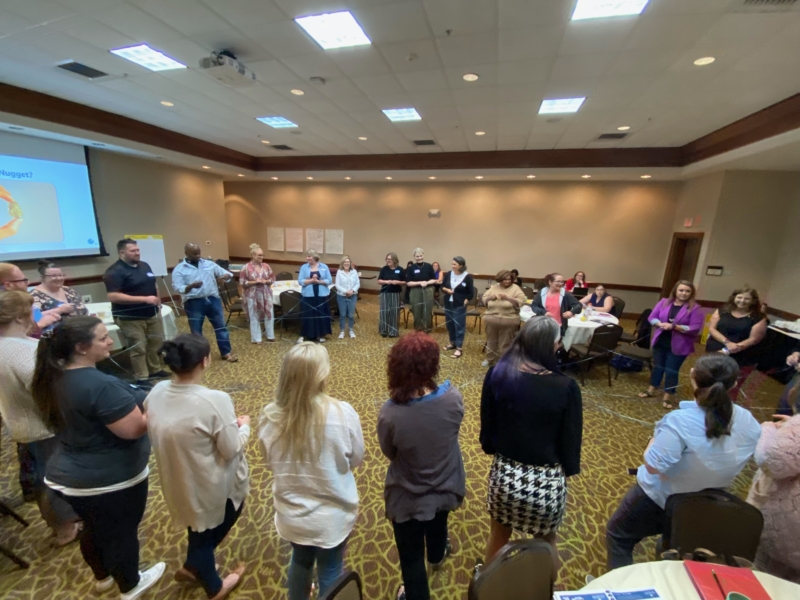Written by: Andi Fetzner, LPC/PsyD
Fred McFeely Rogers (better known as Mr. Rogers) famously offered the advice during times of trouble: “Look for the helpers. You will always find people who are helping.” Many times throughout my life, I have needed that reminder and have found someone to lighten the weight of the stress of the situation. They didn’t always “fix” the problem but just them being there, listening, and witnessing was invaluable.
Westbrook Health Services in West Virginia has a long history of being a helper in the community. Having started in 1949 by another group of helpers, The Junior League of Parkersburg, they have been serving the Mid-Ohio Valley by providing a broad range of services to support those struggling with their mental health.
All helpers at Westbrook including staff, volunteers, and interns complete background checks, a human resource review, and credentials before providing any clinical services. The leaders who support this process are Amanda Cornwell and Olivia Horne, Community Mental Health Trainers and Certified Person-Centered Trauma Informed Care (PCTIC) Trainers. They both participated in a cohort of a train-the-trainer program facilitated by Origins and sponsored by the West Virginia Department of Health and Human Resources in partnership with the West Virginia Health Affairs Institute in Spring 2023. The goal of this program is to help the helpers by training Direct Care Professionals throughout the state on the foundational concepts of PCTIC.
Because the hiring process can vary, training doesn”t always follow the same order for everyone. However, each person eventually learns more about PCTIC and how to apply it in their role within the organization. This approach is less about what the activities are that the helpers are doing and more about how they are doing what they do. This can apply to the administrators and executives, too! “Everyone has Adverse Childhood Experiences (ACEs) and trauma, and it”s like a light bulb goes off when they realize it”s not just about the clients,” Horne explained. During the PCTIC training-of-trainers, one of the activities involved exploring the “why” behind people’s choice of work. Whether they were social service workers, educators, or administrators, the responses were often rooted in a shared motivation: some had received help when they needed it, others hadn’t and now want to be the helper for others or perhaps they saw a need in others and felt driven to fill that role.
The people served by Westbrook face challenges such as addiction and intellectual and developmental disabilities (IDD). As future helpers go through the training, many are surprised to find their own experiences resurfacing, with emotions they “weren’t expecting” being triggered. “Some don’t realize how much this work can affect them,” Horne remarked. Once they reach the PCTIC training, they begin to see common ground. For instance, we all have tough days,” Horne added. Cornwell reported that people also start to recognize, “it might be ME coming in with stress.”
Horne explained that when people start to understand that client behaviors stem from unmet needs—not an intention to cause trouble, but rather a way of communicating—it transforms how they provide help. She used the example of caring for a newborn: “When you have a newborn, you’re in fight or flight for the first two months of their life. The baby is crying because it needs something—they’re trying to feel safe and secure and are seeking to get their needs met.” This shift in perspective fosters empathy and connection among the helpers, encouraging them to be more gracious and considerate with one another. They also learn to reframe the word “consequence,” moving away from a punitive mindset and instead focusing on addressing the underlying need.
Another important lesson Horne and Cornwell have learned as they”ve integrated PCTIC is how the concepts and terms provide a foundation for a shared language among helpers. This common language helps them better understand how to approach their interactions with themselves and others. One example is the Right Response training, which focuses on de-escalation techniques based on universal principles for managing situations safely and skillfully. Cornwell highlighted four key points where these trainings complement each other: first, recognizing that ACEs and trauma are not just present in clients but also in the helpers; second, identifying what a “flipped lid” looks like in oneself and others; third, understanding that helpers need to manage their own emotional state before connecting with others; and fourth, acknowledging that fawning, which can appear as compliance, is often a stress response rooted in fear. Cornwell noted that when these insights were put together, the results were clear: “We got smiles out of it, and everyone understands.”
In the interest of broadening the application of a trauma-informed approach to other organizations that serve their clients, Westbrook also received a Mental Health Awareness Training Grant, which allows Horne to offer PCTIC training to the community at no cost. She has been collaborating with various counties, including working alongside the Family Resource Network and Recovery Houses, to support the helpers who serve these communities. By spreading the practice of this approach, the aim is to reduce trauma by increasing the chances that needs will be met for all children and families in the community—whether they are struggling with IDD, addiction, or other challenges. This proactive approach creates a more trauma-informed, compassionate environment that benefits everyone, not just those directly receiving services. By equipping helpers with these tools, Westbrook is fostering a culture of understanding and empathy, making the broader community a more supportive and resilient place for all.
At Origins, we call acting in a way that is trauma-informed humaning. Horne, as a trainer of PCTIC, reported that the simple, but not always easy, practice of integrating mindfulness has made a big difference for her in staying connected. “It’s about taking the time to reflect, breathe, and reconnect with oneself and others, as part of an ongoing commitment to personal growth and effective caregiving.” As the helpers at Westbrook and across the community gain this self-awareness and the practices of PCTIC, they become more attuned to the needs of those they serve and those they work alongside. This can be a lesson for others and we are here to help support you in your journey.
_________________________________________________________________
To learn more about creating a trauma-informed culture within your organization:
Check out our training programs here
Or
Schedule a free 30-minute consultation call today






